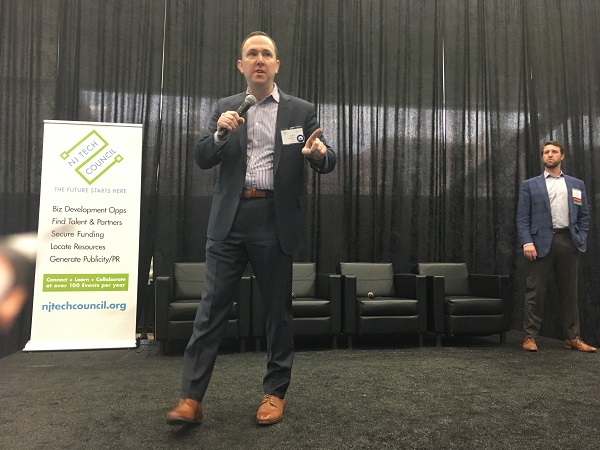Livingston Startup Datafy Speeds Up the IT Assessment Process for Vendors and Hospitals
Infrastructure Software-as-a-Service (SaaS) startups may not be sexy, but they can perform life-saving work.
When hospitals want to deploy new IT resources, they have to conduct an IT assessment of their vendors. That’s not as simple as it sounds, David Barnett, CEO of Datafy, told NJTechWeekly.com. The American Medical Association says that it takes an average of 23 months for a hospital to get a new vendor on board, and Barnett noted that three or four of those months are taken up by an IT assessment. This assessment is done to make sure that vendors are managing patient data properly.
“It’s often new vendors who are the ones that hospitals have chosen to bring in new life-saving advancements for their patients,” Barnett said. “The hospitals want to get the companies that have these products into hospitals and in front of patients as soon as possible.”
Vendors are often new startups with limited funding. They want to work with a hospital and start trials as soon as they can. Delays, which are endemic to this process, can cause a startup to run out of runway.
“We’ve built a SaaS product that automates and streamlines much of that workflow,” Barnett said. “The approach we are taking is a marketplace or exchange type of product, much like the college Common App.”
Right now, each hospital has its own questionnaire that it sends to every vendor, and the hospitals’ questionnaires are all different from each other. “The biggest issue we see from the vendor’s side is that they don’t understand the questions,” Barnett said. A hospital may ask a question about encryption with wording that’s a little different from that seen in another hospital’s questionnaire, but the topic is the same. “We are able to break that down, to be the ‘Rosetta Stone’ for this,” he added.
“Vendors can upload their information and authorize a hospital to get it. We will understand how the hospital wants to see it. We also have a scoring algorithm behind the scenes, so a hospital can tell how well a vendor does, according to the hospital’s standards.”
Hospitals can add a supplemental questionnaire. For example, a children’s hospital may need to ask additional questions. “We are able to accommodate the differences,” Barnett said.
Just launched in January, Datafy already has a minimum viable product (MVP). And the startup has landed its first hospital subscriber, CentraState Healthcare System, in Freehold. Datafy has been able to make such fast progress because its SaaS software is based on technology developed by Corsis (Livingston), Barnett’s previous company, where he remains chairman.
Corsis is a tech-enabled IT advisory firm that does large-scale technology assessments for big private equity firms that are looking at potential investments, and it has done assessments across many different industries.
“We decided to spin the product off into its own company with its own branding because we think there is a large opportunity here. We also thought we would be able to focus on this specific mission better if Datafy were its own company.” David Barnett
To facilitate that work, Corsis built an application based on a large library of best practices of over 1000 regulatory requirements, compliance standards and best practices sourced from published industry standards, state law, federal law and over 20 years of hands-on experience. Then they built a system to score technology operations against those best practices.
Barnett noted that the largest industry segment that Corsis has been helping is the healthcare industry, as the company noticed a need in that market. “There wasn’t a solution that was specifically built to solve the complexity of when a hospital has to assess their vendors and when a vendor has to answer questionnaires for multiple hospitals, all of which are very different and very time-consuming,” he said.
“We decided to spin the product off into its own company with its own branding because we think there is a large opportunity here. We also thought we would be able to focus on this specific mission better if Datafy were its own company.”
The company is seeking funding, and Barnett has been speaking to investors. Barnett pitched at the NJ Tech Council Venture Conference earlier this month. As the company already has its MVP, and a customer, the investment funding would be used for sales and marketing, he told us.
Datafy’s team includes Barnett and Andrew Gansler, chief product officer. Gansler came over from Corsis with Barnett. In fact, the two have been friends since high school. A marketing associate, Steebs Tapia, has been helping the startup get its message out. “We have a few other folks who are with us as independent contractors in sales and development,” said Barnett. “And we are also able to leverage the resources and people over at Corsis, as well.”
Barnett, who is a serial entrepreneur, said that his work in founding Datafy has been rewarding. “It’s really great having a mission that ultimately helps people. We’re not doctors or Ph.D.s. We are infrastructure-type people. But here I can apply all my history and background in tech and infrastructure to allow hospitals to work with their vendors sooner and faster, and help those vendors get their products into the market. It’s really exciting. If we can help both sides work faster and better with each other, we are helping to promote these life-saving advancements.”




